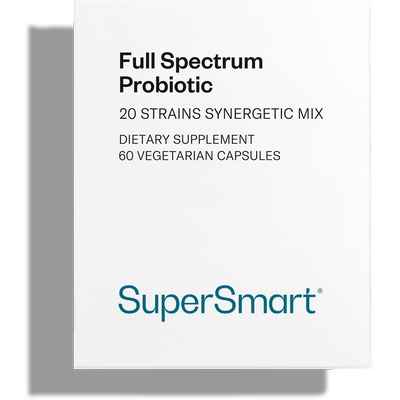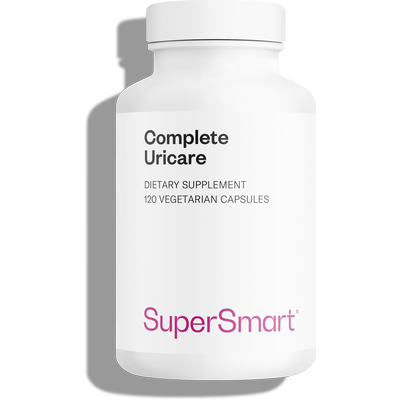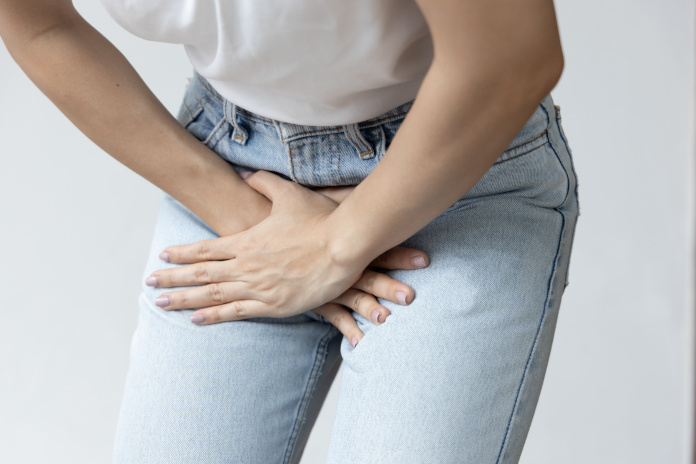Which probiotic should you take for urinary tract infections?
With 50% of women suffering at least one UTI over the course of their lifetime, there’s increasing interest in the potential benefits of probiotics for this complaint. Are they effective? Read on to find out how best to care for this aspect of intimate health.

Urinary tract infections, cystitis: predominantly female problems
The causes of cystitis
Cystitis is inflammation of the bladder which is usually caused by a bacterial infection. The most common culprits are Escherichia Coli which are naturally present in the digestive system, particularly in the colon and rectum.
Cystitis thus develops when these naturally-present E. Coli bacteria migrate from the colon and rectum to the genitals, travelling up the urethra and becoming implanted in the bladder wall. There they colonise the bladder, and the result is a UTI (1).
UTI: symptoms
UTIs produce a range of particularly troublesome symptoms (2):
- burning and pain when passing water;
- a feeling of heaviness or pain in the lower abdomen;
- the urgent need to urinate combined with a weak urine stream;
- cloudy and/or abnormal-smelling urine, which may even contain traces of blood.
Though not usually serious, UTIs can lead to complications, particularly in the kidneys, when the pathogenic bacteria travel along the ureter and colonise the kidneys: it is then referred to as pyelonephritis.
Why does cystitis mainly affect women?
Women have a shorter urethra than men, providing an easier route to the bladder for harmful bacteria.
In addition, the proximity of the anus to the vagina encourages colonisation by bacteria. They migrate to and contaminate the urethra via the hydrolipidic film situated between the anus and vagina.
And during pregnancy and the menopause, the hormonal changes experienced by women can promote urinary stasis (and thus incomplete emptying of the bladder), which itself encourages the growth of pathogenic bacteria in the bladder (these being normally eliminated in urine) (3-4).
Last but not least, during sexual intercourse, the urethral opening is particularly exposed to pathogens and may become contaminated, thus promoting the development of a UTI.
Treating UTIs
Antibiotics
As UTIs are usually caused by infection with E. Coli bacteria, the only treatments health authorities recommend are antibiotics, often single-dose, which eliminates the cystitis symptoms within a few days (5).
Above all - hydration
They also recommend adequate hydration: drinking plenty of fluid means frequent urination, which enables the pathogenic bacteria to be eliminated from the bladder.
With this in mind, some doctors may recommend taking diuretic plants to increase urine volume (dandelion, field horsetail, burdock, etc.).
Cranberry, echinacea and green aniseed: traditional use
Cranberries are small sour berries, often used in North American cooking, which grow in boggy areas and which have become increasingly popular in recent years. Rich in antioxidants and vitamin C, they are considered by many to be a super-food.
But cranberries are primarily reputed to prevent cystitis, due to their high content of proanthocyanidins. These polyphenols are thought to stop E.Coli from adhering to the bladder wall, though this explanation has yet to be confirmed by the EFSA (6).
In addition, the WHO recognises the traditional use of certain other plants for relieving or preventing UTIs: echinacea and aniseed in particular, because of their immunostimulant and antibacterial properties. There are also other natural remedies for cystitis and excellent natural products for urinary tract health in general (such as the synergistic formulation Complete Uricare).
Probiotics for UTIs?
So what’s the thinking on probiotics for fighting UTIs?
Firstly, some studies point to the existence of urinary flora (7) (and thus a microbiota in the bladder). The existence of a vaginal microbiota (also called vaginal flora) has already been proven.
Certain strains of lactobacillus have shown encouraging results in preventing UTIs, especially Lactobacillus rhamnosus GR-1 and Lactobacillus reuteri RC-14, whether administered orally or vaginally (8). A strain belonging to this first species is actually part of the synergistic formulation Vaginal Health, targeted at balancing the vaginal flora.
Several studies investigating the strain Lactobacillus crispatus have also shown an association with a reduction in recurrent UTIs in peri-menopausal women when administered by vaginal suppository (9-10).
However, further research is needed to provide a clear picture of the effects of probiotics on the bladder. But there’s actually another important reason why probiotics should be used in the case of a UTI …
Probiotics: for the gut microbiota following a UTI
Those who are prone to cystitis will usually suffer several episodes a year, and may therefore receive several antibiotic treatments. Yet we know that antibiotics can significantly damage the intestinal microbiota (11).
In this context, probiotics help to maintain a normal intestinal microbiota during, and especially after, antibiotic treatment prescribed for cystitis (12); in such cases, it’s worth considering the probiotics Probio Forte or Full Spectrum Probiotic Formula (which also includes microorganisms from the species Lactobacillus crispatus).
Vaginal and vulval care: some advice
Curative treatments aside, you can act to help prevent a UTI, by taking measures concerned with vaginal and vulval health.
Intimate healthcare in 6 key points!
- it’s a good idea to carry out intimate hygiene at least once - but no more than twice - a day: excessive washing can dry out the vulva, encouraging infection;
- it’s best to use a specific, gentle product for this, not a hard, Marseille soap or any other heavily-fragranced product;
- the vagina is ‘self-cleaning’, precisely because of its flora. There is never any need to shower inside your vagina as you don’t want to ‘clean’ your vaginal flora;
- it’s a good idea to urinate after sex to get rid of potential pathogens from the urethra;
- when you go to the toilet, you should always wipe from front to back to avoid introducing bacteria to the vulva;
- you should never put anything in your vagina that has been in your anus, without first cleaning it, as this will inevitably introduce pathogenic bacteria to the urethra and vagina.
Since the vaginal flora is composed of, amongst others, Lactobacillus rhamnosus, Lactobacillus salivarus, Lactobacillus casei, Lactobacillus acidophilus and Bifidobacterium lactis, many women keen to take optimal care of their vaginal microbiota regularly take probiotic formulations that include these microorganisms (such as Vaginal Health) (13).
SUPERSMART ADVICE
References
- RONALD, A. R. et PATTULLO, A. L. The natural history of urinary infection in adults. The Medical clinics of North America, 1991, vol. 75, no 2, p. 299-312.
- NICOLLE, Lindsay E. Urinary tract infection. Infectious Disease in the Aging: A Clinical Handbook, 2009, p. 165-180.
- PERROTTA, Carla, AZNAR, Mireya, MEJIA, Raul, et al.Oestrogens for preventing recurrent urinary tract infection in postmenopausal women. Cochrane database of systematic reviews, 2008, no 2.
- LUCAS, MICHAEL J. et CUNNINGHAM, F. Gary. Urinary infection in pregnancy. Clinical obstetrics and gynecology, 1993, vol. 36, no 4, p. 855-868.
- https://www.vidal.fr/maladies/reins-voies-urinaires/infection-urinaire-cystite/traitements.html
- GALLIEN, Philippe, AMARENCO, Gérard, BENOIT, Nicolas, et al.Cranberry versus placebo in the prevention of urinary infections in multiple sclerosis: a multicenter, randomized, placebo-controlled, double-blind trial. Multiple Sclerosis Journal, 2014, vol. 20, no 9, p. 1252-1259.
- BRUBAKER, Linda et WOLFE, Alan J. The female urinary microbiota, urinary health and common urinary disorders. Annals of translational medicine, 2017, vol. 5, no 2.
- Falagas ME, Betsi GI, Tokas T, Athanasiou S. Probiotics for prevention of recurrent urinary tract infections in women: a review of the evidence from microbiological and clinical studies. Drugs. 2006;66(9):1253-61. doi: 10.2165/00003495-200666090-00007. PMID: 16827601.
- Uehara S, Monden K, Nomoto K, Seno Y, Kariyama R, Kumon H. A pilot study evaluating the safety and effectiveness of Lactobacillus vaginal suppositories in patients with recurrent urinary tract infection. Int J Antimicrob Agents. 2006 Aug;28 Suppl 1:S30-4. doi: 10.1016/j.ijantimicag.2006.05.008. Epub 2006 Jul 20. PMID: 16859900.
- Stapleton AE, Au-Yeung M, Hooton TM, Fredricks DN, Roberts PL, Czaja CA, Yarova-Yarovaya Y, Fiedler T, Cox M, Stamm WE. Randomized, placebo-controlled phase 2 trial of a Lactobacillus crispatus probiotic given intravaginally for prevention of recurrent urinary tract infection. Clin Infect Dis. 2011 May;52(10):1212-7. doi: 10.1093/cid/cir183. Epub 2011 Apr 14. PMID: 21498386; PMCID: PMC3079401.
- MODI, Sheetal R., COLLINS, James J., RELMAN, David A., et al.Antibiotics and the gut microbiota. The Journal of clinical investigation, 2014, vol. 124, no 10, p. 4212-4218.
- BUTEL, M.-J. Probiotics, gut microbiota and health. Médecine et maladies infectieuses, 2014, vol. 44, no 1, p. 1-8.
- WITKIN, Steven S. et LINHARES, Iara M. Why do lactobacilli dominate the human vaginal microbiota?. BJOG: An International Journal of Obstetrics & Gynaecology, 2017, vol. 124, no 4, p. 606-611.
Keywords
13 Hours
Quality products
Quality products , efficient and effective customer service. You can’t ask more
CLaudia
6 Days
Good quality product and customer service.
So far, I'm liking this product, and the customer service was very good.
ELZL
13 Days
The products I use are excel·lent
The products I use are excel·lent
ROSAS Josep Maria
21 Days
Delivery is prompt and I never saw a…
Delivery is prompt and I never saw a quality problem with the manufacturing. It is not possible to assess efficacy on a personal basis, since too many factors come into play. Efficacy can only be assessed statistically with a sufficient number of cases.
Roger De Backer
22 Days
I collaborates with the Supersmart…
I collaborates with the Supersmart more than 10 years. Every thing is going good. Quality of the things is good. Delivery comes in time. Five stars definitely !!!
Oleksiy
22 Days
All good
Simple, frictionless site, easy ordering, good delivery updates and execution.
Chris Robbins
24 Days
I feel better
I feel better
Peter Ammann
24 Days
Prompt delivery
Prompt delivery
JAKUB Radisch
26 Days
My new go-to for top quality supplements!
I am buying more and more of my supplements from this superb, high quality company. Cannot recommend it enough. Plus, excellent customer service with a quick, helpful team and speedy deliveries. Highly recommend Supersmart!
Cecilie H.
29 Days
SUPERSMART WHAT ELSE👍
SUPERSMART WHAT ELSE👍
DIEDERLE Christophe
32 Days
Excellent quality products with…
Excellent quality products with innovative formulas, as someone who has been suffering with acid reflux, these supplements have been lifesavers.
Oriana Moniz
32 Days
high quality supplement!
high quality supplement!
GALANT
33 Days
Good service prompt delivery
Good service prompt delivery
Mrs Marcella Reeves
38 Days
I like your clear explanation
I like your clear explanation. And how to make a choice of products for a specific health problem
Ingrid
44 Days
Great product and it arrives quickly.
Great product and it arrives quickly.
SOMMARIVA Gianni








